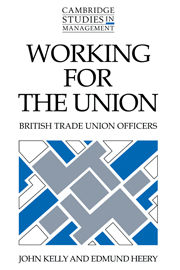Book contents
- Frontmatter
- Contents
- List of figures and tables
- Preface
- List of abbreviations
- Part 1 Introduction
- Part 2 The parameters of union work
- Part 3 The full-time officer at work
- 6 Organizing
- 7 Bargaining objectives
- 8 The bargaining process
- 9 Dealing with managers
- Part 4 Conclusions
- Appendix: Research methods
- Notes
- Bibliography
- Index of names
- Index of subjects
- Cambridge Studies in Management
7 - Bargaining objectives
Published online by Cambridge University Press: 22 October 2009
- Frontmatter
- Contents
- List of figures and tables
- Preface
- List of abbreviations
- Part 1 Introduction
- Part 2 The parameters of union work
- Part 3 The full-time officer at work
- 6 Organizing
- 7 Bargaining objectives
- 8 The bargaining process
- 9 Dealing with managers
- Part 4 Conclusions
- Appendix: Research methods
- Notes
- Bibliography
- Index of names
- Index of subjects
- Cambridge Studies in Management
Summary
Introduction
Collective bargaining with employers is the most time-consuming activity of many trade union officers, and is often their principal point of contact With their unions' membership. Not surprisingly therefore theories of union behaviour have generated a relatively large body of predictions about the bargaining behaviour of officers. For theories of bureaucracy and oligarchy, the union officer acts as a moderating force within the bargaining process, dampening down the unrealistic aspirations of stewards and members, narrowing and accommodating their demands to the economic position of the employers, and avoiding recourse to sanctions proscribed by procedures and statute law. We would consequently expect to find a considerable degree of conflict between stewards and union officers.
The theory of polyarchy suggests that union officers are strongly motivated to retain or enhance their control over the bargaining process. They will consequently prove highly sensitive to any threats to their bargaining rights and will demonstrate a strong preference for procedural objectives (as compared with substantive objectives) and procedural arguments. Contingency theorists have paid particular attention to the structural determinants of officer behaviour, such as workplace size, sophistication of steward organization, collective bargaining structures, trade union policy and bargaining scope. These variables have been used to explain the degree of officer involvement in bargaining and the independence of workplace organization, but they have rarely been used to explain the precise relations between officers and stewards within the bargaining process. Contingency theory therefore directs our attention to a series of structural influences on behaviour but without offering any clear-cut hypotheses about the direction of influence.
- Type
- Chapter
- Information
- Working for the UnionBritish Trade Union Officers, pp. 123 - 143Publisher: Cambridge University PressPrint publication year: 1994



